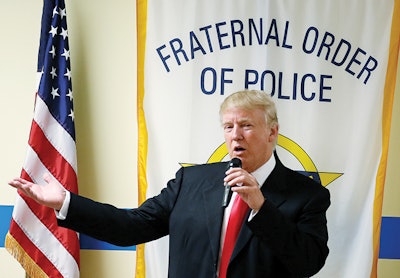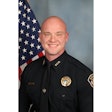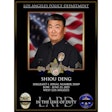 Photo: ©ZUMA PRESS
Photo: ©ZUMA PRESS
One of the most important endorsements that Donald Trump received during the 2016 presidential campaign came from the nation's largest law enforcement union, the Fraternal Order of Police (FOP). When announcing the endorsement, FOP President Chuck Canterbury said the union was backing Trump because "He understands and supports our priorities and our members believe he will make America safe again."
As illustrated by Canterbury's remarks, Trump's supporters in the law enforcement community expect a lot from the new president. But what can the Trump administration really do to uphold the rule of law and assist police in their mission to enforce it?
Respect and Admiration
One thing Trump can do and has done throughout his campaign is to embrace officers both figuratively and literally and show support for them and their loved ones. Law enforcement leaders say Trump's recent phone calls to the families of murdered officers are an illustration of how much he cares about the men and women of the Thin Blue Line.
In contrast, Clinton's actions and statements on the campaign trail, including inviting the mothers of men killed in violent confrontations with officers onto the stage of the Democratic National Convention, did not endear her to law enforcement. Trump-supporting officers were concerned that if she won, her administration would maintain the Obama administration's policies and attitudes.
Jon Adler, president of the Federal Law Enforcement Officers Association (FLEOA) Foundation, says national law enforcement organizations are united in their desire to see an end to the Obama administration's policies and its seemingly adversarial relationship with law enforcement. He says the leaders of the national law enforcement associations recently met with representatives of Trump's transition team, and they spoke in one voice about their needs. "I've never seen everyone agree like that before," Adler says.
What law enforcement wants most from the Trump administration, according to the leaders of some of the national associations, is genuine respect and appreciation. Canterbury believes Trump communicated that respect and admiration to law enforcement officers long before he took office. "One of his campaign staff members complained to me he was always running late because he had to stop and shake every officer's hand," Canterbury says, and he adds that Trump thanked the Secret Service agents and police protecting him during his victory speech the night of the election.
Trump has come out heavily in favor of the rule of law and for officers, even advocating a federal death penalty for cop killers. Canterbury, who met with Trump during the campaign, says he found the new president "to be very interested in officer safety issues and very interested in restoring the trust of the American people in their law enforcement officers, which both he and I believe is still there."
The First 100 Days
America's top executive is restricted in power. The president can't single-handedly enact law. But the president can through executive order set some policies for the federal government. These executive orders can be new or they can refine or even cancel the orders of the previous president. Experts say one way Trump can have immediate impact on law enforcement is to cancel some of Obama's policies.
A major sore point between some officers and the Obama administration has been the restrictions on the 1033 Program, which provides cash-strapped agencies with military surplus equipment. The Obama administration's restrictions on this equipment ostensibly barred agencies from receiving certain types of military equipment.
But what Obama's executive order really did is make it much harder for agencies to acquire even officer safety equipment such as helmets, shields, and trauma kits. Experts say Obama's order required agencies to request the military surplus through their city or county governments, who in the best case don't understand the agencies' needs and in the worst case oppose giving military equipment to officers because it "looks bad."
Adler believes the equipment agencies acquire through the 1033 Program is essential for public and officer safety. "Anything we can give local law enforcement that empowers them to move forward in a proactive manner and engage an active shooter while protecting themselves, we have to do that," he says.
Canterbury is confident the 1033 restrictions will be lifted by President Trump. "We met with the transition team," he says, "and we know the 1033 Program will be addressed very quickly."
Another federal program that has been a target of anti-police activists and others who had the ear of President Obama is civil asset forfeiture. Adler says he believes the Trump administration will realize that the vast majority of people affected by asset forfeiture are drug dealers and the money raised by the program goes to fund joint law enforcement operations between federal and local agencies.
Immigration is another area where law enforcement agencies would like to see Trump take action. Adler says Trump needs to issue an executive order re-establishing the liability protection for agencies that participate in the 287(g) program, which trains local officers to work with Immigration and Customs Enforcement (ICE) on the detention of criminal aliens.
Sanctuary cities are another action item. Trump has said he will do everything in his power to force city governments to cooperate with federal immigration authorities, including cutting off federal funding to those cities. Adler says the Sanctuary City concept endangers public safety and wants to see Trump rapidly defund the cities that refuse to turn over criminal aliens to ICE. Canterbury says the FOP has asked Trump not to cut federal public safety funds to those cities.
On the Border
Trump also vowed during the campaign to stop the flow of illegal immigration at the border by building a wall. Since the election he has toned down that proposal a bit by saying it will be a wall in some areas and a fence in others.
Border expert, author, and consultant Sylvia Longmire believes "reality is sinking in and Trump is being a little more practical. A 2,000-mile wall is not feasible, and it is not necessary," Longmire says.
"When it comes to building a barrier on the border, it's best to take a selective approach. There are natural barriers in areas where a fence is not needed and there are places where a fence has been built and it is doing its job. But that job is sorely misconstrued. A fence alone will not stop people and drugs from coming across. It doesn't stop anything. It just slows people down long enough that they can be identified and apprehended by actual people," she adds.
Longmire, author of "Cartel" and "Border Insecurity," says regardless of what steps Trump plans to take to make the border more secure, it's going to be expensive, and "we don't have the money."
She believes Trump's stated goal of removing criminal aliens is the best solution for improving public safety vs. trying to deport every illegal alien. But even to do that, "we have to give ICE the personnel and resources to find them and have the infrastructure in place to process them and send then where they need to go. We have criminal aliens from all over the world."
One thing Longmire believes Trump has done well so far is to nominate retired general John F. Kelly to head the Department of Homeland Security, the massive federal agency that incorporates numerous former independent law enforcement agencies, including Customs and Border Patrol and ICE. "Up until now no civilian leader has been able to manage that monster. I'm all for putting a military person in that post to make things run smoother and establish a clear chain of command," the retired Air Force intelligence officer who writes for the inhomelandsecurity blog for American Military University, says.
Legal Matters
One of the first decisions the Trump administration makes could affect law enforcement officers for decades, nominating someone to take the place of the deceased Supreme Court judge Antonin Scalia.
Many conservatives supported Trump against Clinton because of the fear of a liberal court, and they had a right to be afraid. Trump's nominee will swing the court back to a 5 to 4 conservative liberal status quo. If Clinton had won she would be naming a liberal-leaning judge to the court and the balance could have shifted substantially, as Reagan-appointed judge Anthony Kennedy tends to swing right or left, depending on the case. "If Hillary had won, we could have ended up with a 6 to 3 liberal-leaning court right off the bat with her nominee and Kennedy's swing vote," says Laura Scarry, a Chicago-based attorney and former officer who represents officers and agencies.
Scarry says in general conservative-leaning courts tend to rule more favorably toward law enforcement, and the Trump court may soon have to rule on some of the most momentous police-involved cases of this century. "The biggest issues affecting law enforcement officers in the Supreme Court in the next four years will be cases having to do with searches and seizures based on technology," she explains. "Our case law just hasn't kept up with the technology."
Trump's Supreme Court nominee will have impact on law enforcement for years to come. But a more immediate impact will come from his nominee for attorney general.
Canterbury says Trump's pick of Alabama Sen. Jeff Sessions to serve as attorney general may be the most important support the new president provides to officers in his first year. "Jeff Sessions is a very pro-law enforcement guy. He believes in justice, and you won't see comments coming out of the Department of Justice about police force incidents before an investigation is complete under his watch," he says.

















